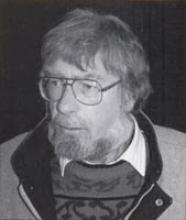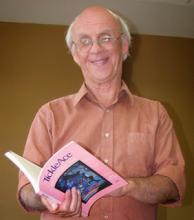Posted on January 6, 2014
By Lorna Crozier
One of the things I admire about Michael Crummey’s work is his nod to traditional forms and the iambic pentameter line. They extend his long reach into the past, yet his poems feel innovative and new because of the subject matter and the toughness and tenderness of his voice. . . .
Photo by Chris Cameron
Posted on December 16, 2013
By Shoshanna Wingate
Carmelita McGrath holds a singular place in the heart of Newfoundland poetry. For an island that loves its poets, this is not a consolation prize for the weird auntie who likes her hats big and bright, but a heartfelt space created for a poet who inspired so many in their development. . . .
Photo by Kerri Cull
Posted on December 9, 2013
By Jeffery Donaldson
Richard Greene begins: “I am at home in a high-rise.” You want to catch the nuance there: the descent motif, finding one’s ground among the contemporary urban domiciles; but also the ascent, the daily routine struggling to rise above itself. Greene’s poems are high-risers that seek a lifting leverage in high-rises. . . .
Posted on December 3, 2013
By George Murray
A transplanted Irishman, Warner fits into the Newfoundland anthology in two ways — first, as a poet who had a significant connection to the Rock before the publication of his first book (he’s been here for 33 years); and second, as a man of wit and stories from a culture of wit and stories. . . .
Posted on November 26, 2013
By Susan Gillis
Rereading the poems collected here, it strikes me that this kind of liminal space is one Sue occupies regularly, at least in poetry. . . .
Posted on November 20, 2013
By Lynn Davies
Some of Mary Dalton’s poems in the Breakwater anthology are brief stories or monologues informed by a vocabulary that also speeds up the telling. Reading “Bridesboys” and “Merrybegot” out loud to myself is a bit like being read to as a child; I hear strange words — brindy bough, upsot, nuzzle-tripe. . . .
Posted on November 14, 2013
By Katia Grubisic
With the publication of the 1999 Mean, from which two of the poems in the Breakwater book are taken, Babstock stood at the cusp of a new Canadian poetics — post-nationalist but snapped in place; as easily confessional as prevaricating, and sometimes simultaneously; and demanding such acrobatics of language. . . .
Posted on November 5, 2013
By John Steffler
I was fortunate to meet Al shortly after moving to Newfoundland in 1975. My whole experience of Newfoundland opened through him and his family, through his parents, their stories and the times I spent in their generous company. . . . Photo courtesy of Newfoundland Heritage
Posted on October 29, 2013
By Stan Dragland
The selection brings out Agnes’s muscular nostalgia for the individualistic Newfoundland past of which her father was a dear part. . . .
Posted on October 24, 2013
By Richard Kelly Kemick
Despite the multitude of successful Newfoundland poets to choose from, Mark Callanan and James Langer’s inclusion of Tom Dawe into Breakwater’s Contemporary Newfoundland Poetry Anthology may indeed have been a no-brainer. . . .
Pages



















